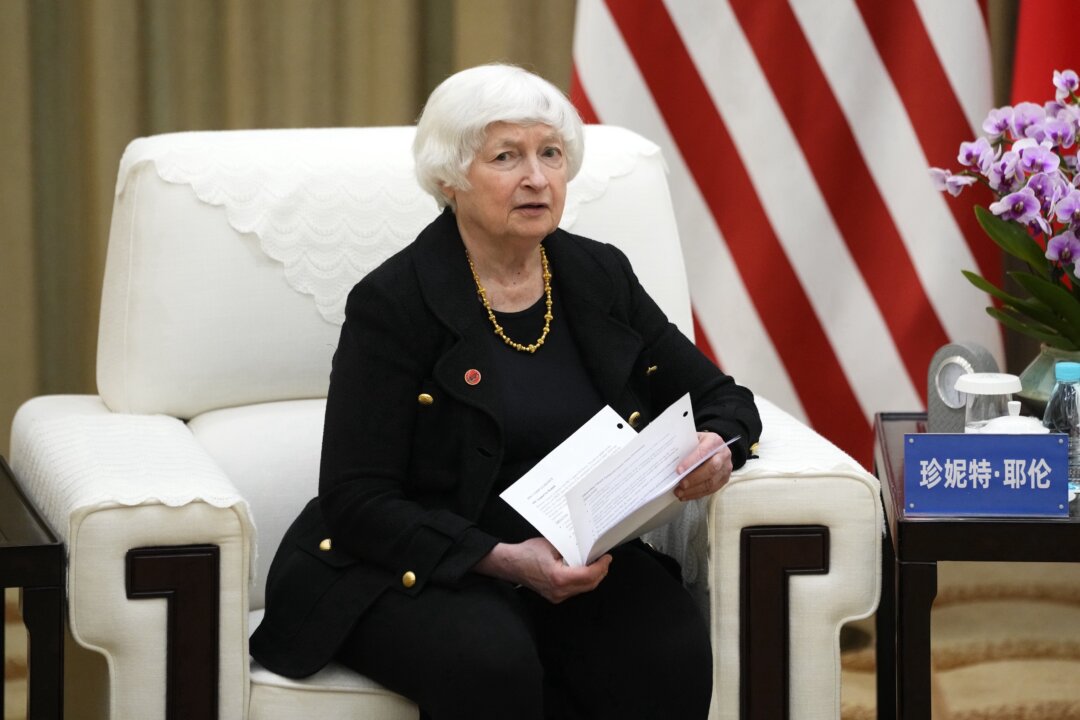The Sino-U.S. relationship ‘needs to be prioritized and nurtured’ by the next U.S. administration, Yellen said.
Treasury Secretary Janet Yellen said she is “probably done” serving in her current post after President Joe Biden concludes his term in January. Before her likely departure, she suggested the possibility of meeting her Chinese counterpart again in China.
“I certainly may go back there,” Yellen said at the Texas Tribune Festival in Austin, Texas, on Sept. 7. “I would welcome a visit by my Chinese counterpart, and my guess is that we will have, one way or another, a visit.”
Yellen, 78, met with her Chinese counterpart, Vice Premier He Lifeng, during a visit to China in April. At the time, she urged China to address its manufacturing overcapacity, particularly electric vehicles, lithium batteries, and solar panels. The secretary emphasized that the United States would not accept another “China shock” of cheap manufactured exports.
The relationship between China and the United States “needs to be prioritized and nurtured” by the next U.S. administration, Yellen said, adding that talks between both sides need to take place at the highest levels as well as among agency personnel.
“We have enough differences and without a chance to discuss them and put them in context, it’s certainly possible for tensions to rise. So this is something that really requires ongoing attention,” Yellen said.
Yellen said climate and debt relief for poor countries are examples of areas in which the two sides can cooperate. Having a relationship with China and other countries would be important in the event of a cross-border financial crisis, she said.
Jay Shambaugh, undersecretary for international affairs at the Treasury Department, will visit China with a delegation “very soon” to discuss economic issues, according to Yellen.
In September last year, the United States and China launched two working groups to discuss economic and financial issues. The economic working group is co-led by Shambaugh and China’s vice finance minister Liao Min.
In July, Shambaugh told the Council on Foreign Relations that the United States may need to take “more creative approaches” beyond tariffs to mitigate the impact of China’s overcapacity.
“We are growing concerned that China’s enduring macroeconomic imbalances and non-market policies and practices pose a significant risk to workers and business in the United States and rest of the world,” he said.
Shambaugh pointed out that China’s production capacity in lithium-ion batteries and solar modules is set to exceed projected global demand by two to three times over the next few years. By 2030, China is expected to have the capacity to produce 70 million electric vehicles, while the global demand would only reach 44 million, he said.
In May, the Biden administration hiked tariffs on Chinese imported electric vehicles from 25 percent to 100 percent, Chinese lithium-ion batteries for electric vehicles from 7.5 percent to 25 percent, and Chinese solar cells from 25 percent to 50 percent.
In July, the European Union enacted tariffs on Chinese electric vehicles ranging from 17.4 percent to 37.6 percent.
In late August, Canada announced it will impose a 100 percent tariff on imports of Chinese electric vehicles.
If Yellen travels to China in the coming months, it will follow U.S. national security adviser Jake Sullivan’s recent trip, where he met with a senior Chinese military official and Chinese Communist Party leader Xi Jinping.
Sullivan’s China trip marks the first China visit by a U.S. national security adviser in eight years.
Reuters contributed to this report.

